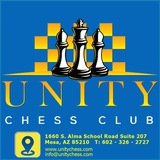White has not only an extra pawn, but an active rook, which is no less important.
Now, the advance ...a6-a5 is impossible, and the black rook remains in a passive position.
This attempt to get active is doomed to failure, since he has no targets on the kingside – the f2-pawn is not only defended, but ensures an excellent post on e3 for the bishop.
With the help of a tactical blow, White ensures himself a pair of connected passed pawns on the queenside. However, even one passed pawn, supported by the bishop, should be enough to win.
Black resigned, since after 36...fxe6 37.Rxb5 Rxa3 38.Rh5+, he will lose a bishop.
Unity Chess Club
Ray Robson 2596 Andrei Stukopin 2460 Moscow 2012 White to move
Black thought his knight on h5, which is heading for f4, was safe. If White plays...
and after taking the knight on h5, the white pawn on d4 hangs. However, White has the zwischenzug.
The Nh5 still hangs, whilst there is now a threat of 21.d6. White has a healthy extra pawn, and went on to win.
Unity Chess Club
Andrei Volokitin 2686 Hedinn Steingrimsson 2562 Germany Bundesliga 2011 White to move
Losing the Bd8, which is X-rayed down the d-file by the white rook, would obviously be catastrophic for Black, because he would be unable to get out his queenside pieces. The only question is where the white knight should go, and the answer is easy to find:
On 25.b4, there would follow 25...b6, and there is nothing decisive.
Also not very effective is 25.Kf4 Re8 26.Nxe4 b6 – the black bishop comes out to d7, and Black can defend.
Also not very effective is 25.Kf4 Re8 26.Nxe4 b6 – the black bishop comes out to d7, and Black can defend.
